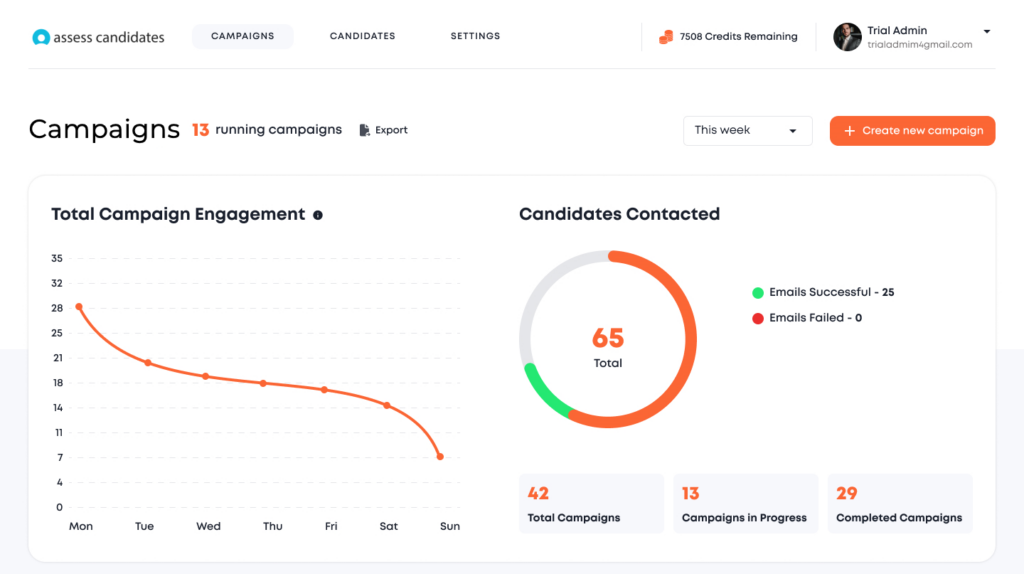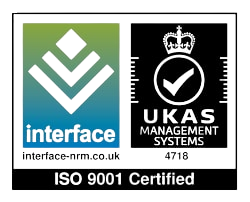How engaging assessments impact the recruitment funnel
In talent acquisition, understanding and mastering recruitment funnel strategies is key to attracting and selecting the best-fit candidates for your organisation. As a recruiter, how do you currently organise your approach to hiring?
In this article we embark on a journey through the stages of the recruitment funnel and the role that engaging assessments play within it. We begin by explaining what the recruitment funnel is, demonstrating its stages and illuminating the path candidates traverse from their initial interest in job vacancy to the hiring decision. Then, we discover how engaging assessments attract job candidates, enhance their candidate experience, and contribute to the overall efficiency of your talent acquisition process. Next, we explore the benefits from the use of engaging assessment tools in your recruitment campaigns. Finally, we uncover the best strategies for implementing engaging assessments into your recruitment funnel.
This comprehensive guide will equip you with the knowledge and strategies needed to transform your recruitment efforts into a powerful framework, achieving both recruitment efficiency and candidate satisfaction.
Contents
- What is the recruitment funnel?
- What role do engaging assessments play in the recruitment funnel?
- What are the benefits of engaging assessments for your recruitment funnel?
- What are the best strategies for implementing engaging assessments into your recruitment funnel?
- How can the Assess Candidates platform enhance an organisation’s recruitment funnel?
- FAQs and Glossary of Terms.
1. What is the recruitment funnel?
The recruitment funnel is a foundational concept in talent acquisition, serving as a strategic framework that visualises how candidates go through a multi-stage recruitment journey. You should imagine your recruitment as a series of gates that your candidates must pass through as they progress from being unaware of your job opportunities to becoming enthusiastic members of your organisation. To truly grasp the recruitment funnel, let’s explore each of its key stages in detail.

What are the stages of the recruitment funnel?
1. Awareness Phase:
At the top of the recruitment funnel lies the awareness phase. This is where potential candidates first become aware of your job vacancies and your organisation. Candidates may encounter your job postings on various platforms such as job boards, your company’s career website, social media, or through word-of-mouth referrals. Imagine a recent graduate, Emily, who stumbles upon your job posting for an entry-level marketing position while browsing LinkedIn. At this stage, Emily has entered the recruitment funnel with a spark of interest.
Organizations with a strong employer brand see 50% more qualified talents and take 1-2 times faster to hire.
2. Attraction Phase:
The Attraction phase follows the Awareness stage. At this point, candidates like Emily who have become aware of the company and its job opportunities start to show genuine interest. They might visit the company’s careers page, sign up for job alerts, or engage with the company on social media. The goal is to nurture this interest and encourage candidates to explore the available positions.
Did you know that 79% of job seekers are likely to use social media in their job search and this increases to 86% for younger job seekers?
The Open University (2019)
3. Interest Phase:
Once candidates like Emily become aware of your job openings, they move into the Interest phase. Here, they start to dig deeper into what your company has to offer in terms of job opportunities. They research your company’s culture, values, reputation, and the specific role they are interested in. Emily, for instance, begins to explore your company’s website, reads employee testimonials, and learns about your marketing team’s achievements.
4. Application Phase:
In this phase, candidates decide to take the plunge and submit their applications. Emily, having thoroughly researched your company, decides to send in her application, complete with her resume and a well-crafted cover letter showcasing her enthusiasm for the marketing role.
Did you know that most candidates don’t want to complete an application that will take longer than 20 minutes.
Careerbuilder
5. Screening Phase:
After applications are received, the recruitment team enters the screening and interview phase. They evaluate candidates’ qualifications and suitability through resume reviews and initial interviews. Emily, for example, may have a video interview where her qualifications and experience are assessed.
6. Evaluation and Offer Phase:
At this point, a smaller pool of candidates remains, and the Evaluation becomes more detailed. Candidates like Emily may be asked to complete skills assessments, participate in in-depth interviews, or even attend assessment centres. After a rigorous evaluation process, a job offer is extended to the candidate who aligns best with the company’s requirements.
7. Hiring Phase:
Once the offer is accepted, the candidate transitions into the Hiring phase, officially becoming an employee. Emily, having accepted the marketing position, joins your organisation as a valuable member of the marketing team.
Understanding and optimising each stage of the recruitment funnel is crucial for talent acquisition success. By recognizing that candidates progress through these distinct phases, organisations can tailor their recruitment strategies to engage candidates effectively, improve candidate experience, and ultimately make informed hiring decisions that lead to the acquisition of top talent.
Optimise your recruitment funnel with us today. Hire For Free
2. What role do engaging assessments play in the recruitment funnel?
Once you understand the concept of the recruitment funnel, it is easier to see how engaging assessments can become the key point for your organisation in holding the recruitment funnel together, providing candidates with interactive experiences that resonate with real-life challenges and opportunities. To truly understand their pivotal role, let’s explore how engaging assessments transform the recruitment process with examples from real-life companies.
What are examples of companies with good recruitment funnels? What are some benefits of an optimised recruitment funnel?
1. Captivating Candidates from the Start (Google):
Engaging assessments captivate candidates right from the beginning. Take the tech giant Google, for instance. Google’s recruitment process is well-known for its engaging and innovative assessments. They have designed online coding challenges that test candidates’ programming skills. These challenges not only assess candidates’ abilities but also provide them with a taste of the challenging projects they’ll work on at Google. This engagement from the outset attracts top talent who are excited about the company’s work.
2. Enhancing the Candidate Experience (Airbnb):
Engaging assessments contribute significantly to the candidate experience. Airbnb, a leader in the sharing economy, uses engaging video interviews as part of their recruitment process. Candidates record video responses to questions, allowing them to showcase their personality and communication skills. This not only provides Airbnb with a deeper understanding of candidates but also makes candidates feel more involved and valued in the process.
Companies recording positive candidate feedback on hiring experience also reported a 70% improvement in the quality of hires.
Glassdoor
3. Making Informed Decisions (McKinsey & Company):
Engaging assessments serve as powerful tools for informed decision-making. The global consulting firm McKinsey & Company employs case interviews as part of their assessment process. Candidates are presented with real-world business scenarios and are asked to analyse and solve them. This not only evaluates their problem-solving skills but also gives candidates a glimpse into the type of work they would do at McKinsey. As a result, candidates can make more informed decisions about whether the company aligns with their career goals.
Up to 78% of resumes are misleading and up to 46% contain actual lies! Engaging assessments will help your company find the real top talent.
Criteria Pre-Employment Testing
4. Increasing Efficiency and Accuracy (Amazon):
Engaging assessments improve hiring efficiency and accuracy. For instance, the retail giant Amazon utilises online proctored assessments to evaluate candidates’ skills for various roles. These assessments, which include scenario-based questions and practical exercises, help Amazon quickly identify candidates who possess the necessary skills. This efficiency ensures that candidates who advance further in the process are highly qualified.
Did you know that 57% of candidates will lose interest in the vacancy if your hiring process is too lengthy? An optimized recruitment funnel is key.
Robert Half
5. Ensuring Alignment with Company Culture (Zappos):
Engaging assessments can also assess cultural fit. Zappos, an online shoe and clothing retailer known for its unique company culture, includes culture-fit assessments in their recruitment process. Candidates are asked questions that evaluate their alignment with the company’s core values, ensuring that new hires fit seamlessly into the Zappos culture.
By integrating engaging assessments like these into the recruitment funnel, organisations like yours can engage candidates, improve the overall candidate experience, make more informed hiring decisions, and streamline their recruitment processes, all while showcasing their company’s values and culture.
Enhance your recruitment strategy with end-to-end engaging assessments. View Plans
3. What are the benefits of engaging assessments for your recruitment funnel?
As we see from the section above, the role of engaging assessments in your recruitment is essential. It offers a multitude of benefits that positively impact the recruitment process. Let’s explore these benefits in more detail with real-world examples of companies.

What benefits do engaging assessments bring to the recruitment funnel?
1. Enhanced Hiring Efficiency:
Imagine a scenario where your company receives hundreds of applications for a single job opening. Without engaging assessments, your HR team may spend endless hours sifting through resumes. However, by utilising assessments, such as automated skills tests or video interviews, recruiters can quickly identify the most qualified candidates. This efficiency not only saves time but also ensures that only candidates with the necessary skills and qualifications proceed further.
Did you know that 66% of candidates will wait less than 2 weeks to hear back before moving on to another opportunity?
Career Builder
2. Improved Hiring Accuracy:
In traditional hiring, judgments are often based on resumes and interviews alone, which can be subjective. Engaging assessments, on the other hand, provide concrete data points for evaluating candidates. Consider a situation where two candidates have equally impressive resumes for a software development role. Engaging coding assessments can reveal their actual coding skills, making it easier to make an informed decision.
Did you know that the average cost of a bad hire is estimated to be 30% of that hire’s annual salary?
3. Elevated Candidate Experience:
A positive candidate experience is crucial in today’s competitive job market. Engaging assessments, such as immersive simulations or realistic job previews, give candidates a taste of what it’s like to work at your organisation. This not only piques their interest but also creates a favourable impression. For example, a candidate who participates in a virtual reality-based assessment that simulates a typical workday might feel more connected to your company.
Did you know that employer branding has a significant impact on hiring talent according to 80% of recruiters? (LinkedIn Global Recruiting Trends, 2017) Also, companies with positive brands get 2x as many applications as companies with negative brands, and they spend less on employees (Betterteam Blog, 2017).
4. Optimised Recruitment Strategy:
Engaging assessments provide valuable insights into your recruitment process. By analysing assessment results, you can identify trends, strengths, and weaknesses in your candidate pool and your hiring process. This data-driven approach enables continuous improvement and optimization of your overall recruitment strategy.
4. What are the best strategies for implementing engaging assessments into your recruitment funnel?
The benefits demonstrated in the section above show how engaging assessments go beyond traditional hiring methods, significantly enhancing the recruitment process, and ultimately leading to better hiring decisions made by your team.

However – implementing engaging assessments effectively will also require a thoughtful and strategic approach from your recruitment team. Here, we’ll delve into the best strategies for seamlessly integrating engaging assessments into your recruitment funnel, ensuring a streamlined and effective process.
Streamline your hiring process. Hire For Free!
How to add assessments to your recruitment funnel
- Assessment Alignment: Start by aligning assessments with your specific job roles and organisational culture. For example, if you value creativity and innovation, design assessments that allow candidates to showcase their creative problem-solving skills.
- Candidate-Centric Design: Create assessments with the candidate experience in mind. Ensure they are user-friendly and interactive. Consider incorporating multimedia elements, such as video introductions from your team or virtual office tours, to engage candidates further.
Did you know that 60% of applicants abandon the recruitment process if it is too complex and stressful?
Zety
- Clear Communication: Clearly communicate the purpose of assessments to candidates. Explain how assessments fit into the overall hiring process and how they benefit both the candidate and the organisation. This transparency helps candidates feel more comfortable and engaged.
Nearly 63% of candidates report dissatisfaction with the communication received from employers after applying.
Talentegy
- Continuous Feedback: Provide feedback to candidates based on their assessment results, even if they aren’t selected. Constructive feedback can enhance the candidate experience and leave a positive impression, potentially encouraging them to reapply in the future.
- Data Analysis and Iteration: Analyse the data collected from assessments to refine your recruitment strategy continually. Identify areas for improvement and adjust your assessments accordingly. For instance, if you notice that a particular assessment isn’t effectively predicting job performance, consider revising it.
By implementing these strategies, your company can harness the full potential of engaging assessments in your recruitment funnel, creating a more efficient and candidate-centric process that leads to better hiring decisions and increased candidate satisfaction.
5. How can the Assess Candidates platform enhance an organisation’s recruitment funnel?
Partner with Assess Candidates and revolutionise your recruitment process, attracting top talent, improving efficiency, and ultimately achieving recruitment success.
5 Ways Assess Candidates can help Optimise your Recruitment Funnel
- Integrates Engaging Assessments: Partnering with Assess Candidates enables you to strategically integrate engaging assessments at every stage of your recruitment funnel, from attracting top talent to making informed hiring decisions.
- Streamlined Recruitment: Our platform streamlines the candidate evaluation process, enhancing hiring efficiency and accuracy. Say goodbye to tedious manual screening and hello to a more efficient hiring process.
- Enhanced Candidate Experience: Assess Candidates’ assessments create a positive candidate experience, leaving a lasting impression. Candidates engaged through our platform are more likely to accept job offers and become loyal employees.
- Data-Driven Insights: Gain valuable insights from assessment data, allowing you to continuously refine your recruitment strategies. Make data-driven decisions that optimise your funnel and lead to better hires.
- Cultural Fit Assessment: We offer assessments that evaluate cultural fit, ensuring candidates align with your organisation’s values and culture, leading to a harmonious and productive work environment.

Example of how Assess Candidates can help your company improve the recruitment funnel
Problem:
Historically, various colleagues have taken charge over the different parts of the recruitment process. Hiring managers believe there is inconsistency between the way job vacancies are advertised, and the successfulness of the assessment process. Your company has also received mixed feedback from recently on-boarded employees about their satisfaction with the process.
Assess Candidates Solution:
With the Assess Candidates team you can count on a holistic view that will encompass all parts of the recruitment process. We will help you with all parts of the hiring process, starting from the way you invite candidates, all the way through the recruitment process to the point where your selected candidates receive the hiring outcomes and are on-boarded to the firm. With our proven track of success with companies of all sizes and different industries, you can stay assured no aspect of the hiring process will be left unnoticed. We believe that the candidate experience and the robustness of the assessment phase is of the utmost importance to ensure the success of your recruitment campaigns. We will employ cutting-edge technology and decades of experience in hiring to bring tangible results to your team.
6. FAQs and Glossary of Terms.
FAQS
- What exactly is the recruitment funnel, and how does it work?
- The recruitment funnel is a systematic framework that guides candidates through different stages of the hiring process, from initial awareness of job openings to the final hiring decision. It helps organisations manage and optimise their talent acquisition efforts.
- How does the recruitment funnel impact the hiring process?
- The recruitment funnel allows organisations to visualise and structure the hiring process. It helps in identifying areas for improvement, streamlining the candidate experience, and ultimately attracting and selecting the best-fit candidates.
- Why is understanding the recruitment funnel important for businesses?
- Understanding the recruitment funnel is crucial because it enables businesses to improve their hiring efficiency, candidate experience, and overall recruitment strategy. It helps in making informed decisions that lead to better hires.
- What are the key benefits of using engaging assessment tools in recruitment campaigns?
- Engaging assessment tools offer several benefits, including improved candidate selection, reduced bias, time savings, and enhanced candidate experience. They help organisations identify the best-fit candidates more efficiently, leading to better hiring decisions and higher candidate satisfaction.
- What are the examples of engaging assessments used in the recruitment process?
- Engaging assessments can take various forms, such as skills tests, situational judgement assessments, personality assessments, and Game-based Assessments. These tools are designed to engage candidates while providing valuable insights into their suitability for a role.
- What strategies should organisations consider when implementing engaging assessments into their recruitment funnel?
- Implementing engaging assessments successfully involves strategies like careful assessment selection, seamless integration into the recruitment process, clear communication with candidates, and ongoing assessment validation to ensure accuracy and fairness. This ensures that assessments enhance the recruitment funnel effectively.
Glossary of Terms:
- Candidate Experience – The overall perception and interaction a job candidate has with your company during the recruitment process, encompassing all touchpoints from initial contact to onboarding.
- Engaging Assessments – Interactive assessment tools and methods used in the recruitment process to evaluate candidates’ skills, abilities, and cultural fit, while also providing an engaging and informative candidate experience.
- Recruitment Optimisation – The process of continuously refining and improving recruitment strategies and practices to enhance efficiency, candidate experience, and the overall success of talent acquisition efforts.
